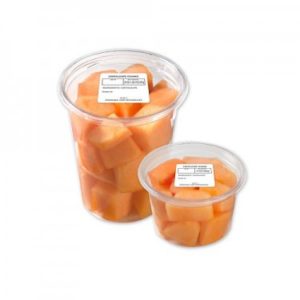Cantaloupes, marketed as “Rocky Ford,” were implicated in the U.S. multistate outbreak of listeriosis in 2011, which caused multiple fatalities. Listeria monocytogenes can survive on whole cantaloupes and can be transferred to the flesh of melons.
 The growth of L. monocytogenes on fresh-cut “Athena” and “Rocky Ford” cantaloupe cultivars during refrigerated storage was evaluated. Fresh-cut cubes (16.4 cm3) from field-grown cantaloupes were each inoculated with 5 log10 CFU/mL of a multi-strain mixture of L. monocytogenes and stored at 4°C or 10°C. Inoculated fresh-cut cubes were also: (1) continuously stored at 4°C for 3 days; (2) temperature-abused (TA: 25°C for 4 h) on day 0; or (3) stored at 4°C for 24 h, exposed to TA on day 1, and subsequently stored at 4°C until day 3. L. monocytogenes populations on fresh-cut melons continuously stored at 4°C or 10°C were enumerated on selected days for up to 15 days and after each TA event. Brix values for each cantaloupe variety were determined. L. monocytogenes populations on fresh-cut cantaloupe cubes stored at 4°C increased by 1.0 and 3.0 log10 CFU/cube by day 7 and 15, respectively, whereas those stored at 10°C increased by 3.0 log10 CFU/cube by day 7.
The growth of L. monocytogenes on fresh-cut “Athena” and “Rocky Ford” cantaloupe cultivars during refrigerated storage was evaluated. Fresh-cut cubes (16.4 cm3) from field-grown cantaloupes were each inoculated with 5 log10 CFU/mL of a multi-strain mixture of L. monocytogenes and stored at 4°C or 10°C. Inoculated fresh-cut cubes were also: (1) continuously stored at 4°C for 3 days; (2) temperature-abused (TA: 25°C for 4 h) on day 0; or (3) stored at 4°C for 24 h, exposed to TA on day 1, and subsequently stored at 4°C until day 3. L. monocytogenes populations on fresh-cut melons continuously stored at 4°C or 10°C were enumerated on selected days for up to 15 days and after each TA event. Brix values for each cantaloupe variety were determined. L. monocytogenes populations on fresh-cut cantaloupe cubes stored at 4°C increased by 1.0 and 3.0 log10 CFU/cube by day 7 and 15, respectively, whereas those stored at 10°C increased by 3.0 log10 CFU/cube by day 7.
Populations of L. monocytogenes on fresh-cut cantaloupes stored at 10°C were significantly (p < 0.05) greater than those stored at 4°C during the study. L. monocytogenes showed similar growth on fresh-cut “Athena” and “Rocky Ford” cubes, even though “Athena” cubes had significantly higher Brix values than the “Rocky Ford” fruit.
L. monocytogenes populations on fresh-cut cantaloupes exposed to TA on day 1 and then refrigerated were significantly greater (0.74 log10 CFU) than those stored continuously at 4°C for 3 days. Storage at 10°C or exposure to TA events promoted growth of L. monocytogenes on fresh-cut cantaloupe during refrigerated storage.
Survival and growth of Listeria monocytogenes on fresh-cut “Athena” and “Rocky Ford” cantaloupes during storage at 4°C and 10°C
Nyarko Esmond, Kniel Kalmia E., Reynnells Russell, East Cheryl, Handy Eric T., Luo Yaguang, Millner Patricia D., and Sharma Manan. Foodborne Pathogens and Disease. August 2016, ahead of print. doi:10.1089/fpd.2016.2160.
